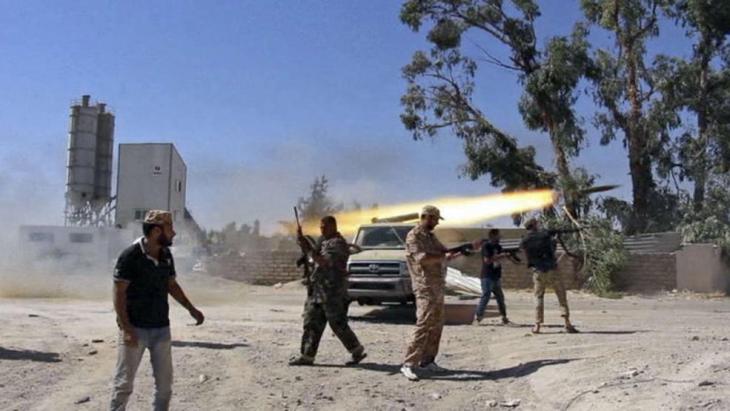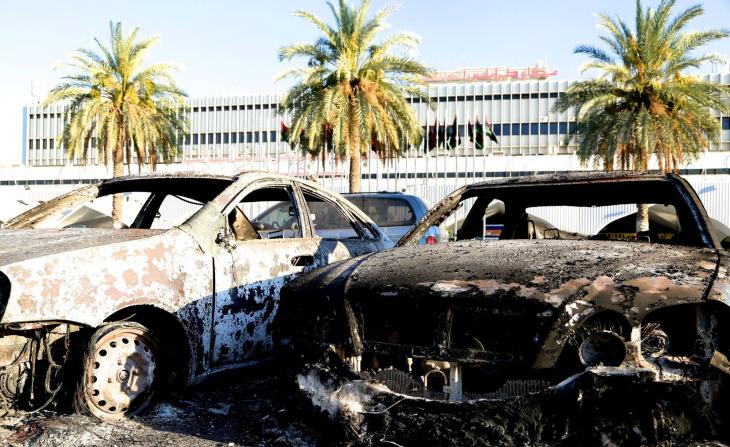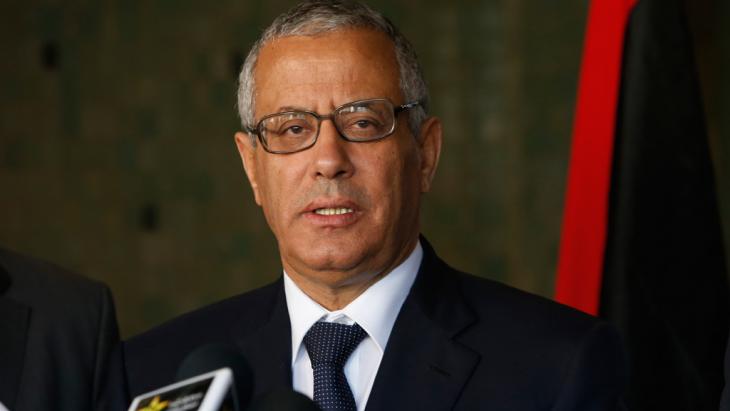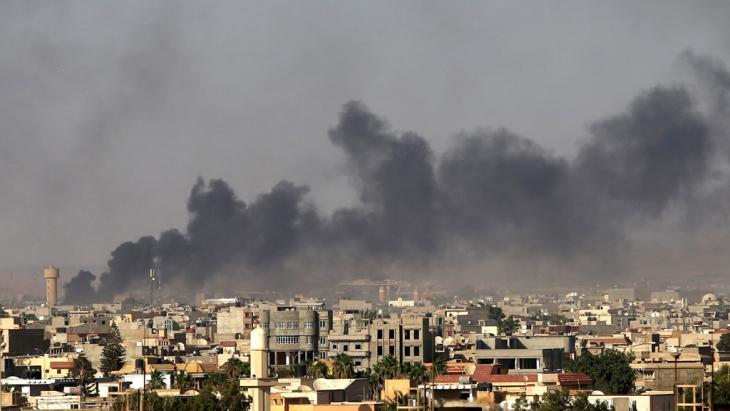The battle for Tripoli

Tripoli International Airport is a battlefield. Dozens of burnt out aircraft, a crumbling passenger terminal and a control tower riddled with bullets all bear witness to the fact that it will be a while before air traffic resumes here.
A few kilometres away, where rockets have hit a fuel depot, a giant cloud of smoke rises into the sky. Local residents are evacuating the area as militias continue to fight over the airport. At least a hundred people have been killed in the crossfire and indiscriminate shelling. Thus far, the Libyan capital has been all but spared the violence that hit Benghazi. Now, however, Tripoli is also descending into chaos, despite the fact that Libyans voted for a new legislature only a month ago.
In July 2012, Libya held its first free election after four decades of autocratic rule. The General National Congress (GNC) that emerged then is due to step down on Monday, 4 August 2014 and hand over power to the newly elected House of Representatives, which is also considered a transitional institution.
Meanwhile, a 60-member assembly that was elected in February has 18 months to draft Libya's new constitution. Once the constitution has been approved by public referendum, a permanent legislature and government can be elected, putting an end to the transitional period. This, at least, is what the political roadmap last amended by the GNC in February 2014 says. In parallel, however, the last two years have seen the emergence of informal power blocks whose infighting is now preventing the formation of a stable government.
The current conflict can be traced back to 2012, when Libyan voters had dozens of new political parties to choose from. What distinguished these parties from each other was the role they attributed to Islamic Sharia law and their dealings with former elites. "Azlam", regime remnants, as they are referred to, are people who held positions of responsibility under Gaddafi and now wish to be part of the new Libya. On the opposite side are the "thuwwar", mostly youthful revolutionaries, who want the root-and-branch reform of society.

Congress as a conflict catalyser
The outgoing GNC is commonly viewed as conflict catalyser. The political landscape that formed in 2012 was immature, and consensus was difficult to reach in a legislature where 120 of the 200 members were independents.
Congress quickly split into two cross-party coalitions: the revolutionary Islamist Martyrs Loyalty Block and the comparatively liberal and secular National Forces Alliance (NFA), also at times the Block of 96.
Their rivalry crystallised around the Political Isolation Law, on the basis of which Libyans who held positions of responsibility under the previous regime are barred from holding office in post-revolution Libya.
In the spring of 2013, the pro-isolation lobby succeeded in pushing through a text that disqualifies Gaddafi-era officials who joined the opposition, while at the same time sweeping the reconciliation of the Islamist opposition with the regime from around 2008 under the carpet. Allied militias from the revolutionary stronghold and coastal town of Misrata laid siege to the congress hall until parliamentarians gave in to their demands. Since then, the liberals have been trying to bring about an annulment of the law. However, the judges of the Supreme Court who were meant to decide on the matter have repeatedly postponed their decision, fearing retribution. Another bone of contention between the two political camps was Prime Minister Ali Zeidan, whom the Martyrs Loyalty Block eventually ousted in March 2014. Zeidan's brief abduction in October 2013 on the orders of a group of GNC members highlighted the fine line between politics and violence in Libya.
The other camp practices equally little restraint. Militias from the small mountain town of Zintan – also a revolutionary stronghold, but now aligned with the liberals – has been in control of Tripoli Airport since 2011, despite pledges that it would hand over the facility to the army.
The liberal coalition has repeatedly tried to use coercion to change the rules of the game. In February of this year, for example, Zintan militias ordered parliamentarians to step down, and their ally Major-General Khalifa Haftar declared a coup.
Haftar's military campaign against radical Islamist militias in eastern Libya is now in its third month. The offensive, dubbed "Operation Dignity", weakens the revolutionary Islamist coalition, owing to its leaders' close ties with militias in Benghazi.

A loss of influence
The coalition now fears it will lose its present influence once sovereignty has been transferred to the House of Representatives.
The Islamists are said to have done badly in the legislative elections on 25 June, although the allocation of seats this time around is less clear than it was in 2012 as there are only independent candidates and no party lists this time.
The attack on Zintan's bases in Tripoli can be seen as an attempt to retain the upper hand in the power struggle. Controlling the airport not only generates income, it also allows for the surveillance of travellers and arms smuggling. On several occasions, entire weapons shipments disappeared from the tarmac only to reappear in the hands of Zintan forces.
Sooner or later, their opponents were bound to intervene, which they now have with the present "Operation dawn". The Islamists control the much smaller military airport of Maitiga, in Tripoli, as well as Misrata Airport. This triggered rumours that the mission's objective was not the takeover of the airport but its total destruction. If no other alternatives are found, the revolutionary Islamist coalition will benefit considerably.
The battle for the airport resulted in the departure of foreign diplomats and other expatriates. Maitiga Airport has little capacity, and at present, the only other possible exit route is the road to Tunisia.

Not a drop of fuel
It does not look as if foreign nationals are being specifically targeted, but past incidents are proof enough of the potential risks. For residents in the capital, daily life is becoming an increasing challenge, with lengthy power-cuts and massive queues at petrol stations every day.
If the fire at the petroleum depot is not contained soon, Tripoli will have no fuel at all. But for the warring militias, the destruction is no reason to stop. At checkpoints in Misrata, drivers heading to Tripoli are forced to pour out any extra fuel they have taken with them in order to prevent a single drop arriving in Tripoli, says a local reporter on his arrival in the capital.
While the militias fight for power and territory, it is the ordinary citizens who are losing out the most in the present conflict. A peaceful solution seems increasingly elusive. There is also doubt that the House of Representatives that is supposed to take over in a few days will do any better than the GNC.
Lately Libyans, including the fragile acting government, have been calling for international peace forces. But the chaos that reigns in Libya and the unfavourable climate on the international stage make this scenario rather unlikely.
Valerie Stocker
© Qantara.de 2014
Editor: Aingeal Flanagan/Qantara.de
